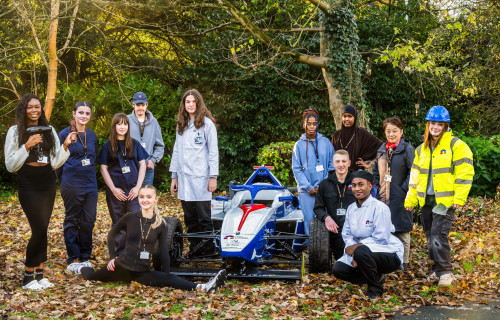FdSc Professional Aviation Engineering Practice (with Foundation Year)
-
5
Level
Level 5 -
Duration
3 years -
Start Date
September 2025 -
Venue
International Aviation Academy Norwich -
Course Code
F0097
This programme is subject to validation / revalidation by UEA, ready to accept new entrants from September 2025. Therefore, for next year there may be some changes to this advertised course content following this process
What You Will Study
This specialist aviation engineering degree course will allow you to gain practical experience alongside advanced academic study. Delivered in partnership with KLM UK Engineering and awarded by University of East Anglia, this course has been designed to ensure you develop the knowledge, technical skills, understanding and awareness necessary to work in technical, supervisory or management roles in the industry and will help kick start your journey to a high-flying career.
This course allows you to work on a fully functional Boeing 737 aircraft in the International Aviation Academy Norwich’s (IAAN) world class Aviation Emulation Zone® whilst studying in our first class learning environment at IAAN.
The programme provides applicants with the opportunity to pass UK CAA (Civil Aviation Authority) Cat A examinations in their foundation year and then B1.1 examinations during the Foundation degree, alongside academic study for an aviation degree.
Delivery of modules will be in blocks by KLMUKE instructors including a minimum of 2400 hours in the Foundation degree in a Part 147 environment, as specified in the approved organisations Maintenance Training Organisation's Exposition (MTOE) submitted to the Civil Aviation Authority (CAA) to satisfy the requirements of UKCAA Part 147
Course Structure
Foundation Year
Engineering Fundamentals
Aerodynamics & Electronic Instrument Systems
Aircraft Materials & Hardware
Aircraft Maintenance
Human Factors & Aviation Legislation
Turbine Engines and Propellers
Workshop and Hangar Practice
Turbine Aeroplanes
LEVEL 4
Human Factors and Legislation
Maintenance Practices
Materials and Hardware
Application of the principles of Physics
Workshops and Aircraft Practices
Higher Learning Skills
LEVEL 5
Electrical Fundamentals
Engines and Propellers
Aeroplane Aerodynamics, Structures and Systems
Electronic Fundamentals, Digital Techniques and Aerodynamics
Why Choose City College Norwich?
Flexible study options
Most of our courses require two days per week attendance at college. This means you can continue to work alongside your studies and balance other commitments.
Smaller class sizes
Our smaller class sizes mean you get all the support you need during your studies. This is a crucial difference to larger universities and provides you with access to your lecturers when you need them.
Outstanding progression
97% of our full time graduates and 100% of our part time graduates are in employment or further study 6 months after completing their degree (Teaching Excellence and Student Outcomes, 2019, for CCN, published by Office for Students)
Entry Requirements
Standard:
Applicants will need: -
64 UCAS points (a BTEC National Diploma or Certificate in non-engineering subjects may satisfy entry requirements provided the student has 5 GCSE’s as below).
and
GCSE (4+): five subjects, including English Language and Mathematics
Successful Interview
Non- standard:
Completed some EASA / UKCAA Part 66 examinations
Part completed BCAR Section L licence course
Aircraft maintenance related work experience
Other engineering courses or experience
Successful Interview
How You Will Be Assessed
Foundation Year: UKCAA Part 66 Modules Category A: 1-6, 7A, 8, 9A, 10, 11A, 15 & 17A
FdSc: UEA validated assessment per module + UKCAA Part 66 Modules Category B1.1: 1-6, 7A, 8, 9A, 10, 11A, 15 & 17A
Course Progression
BSc (Hons) Professional Aviation Engineering Management Top-Up
Where Your Course Can Take You
Aviation Engineering
Fees
£9,250 per year (for UK students)
For international students (students from outside of the UK), fees are set at £14,335 per year
Where Next?
Why Choose City College Norwich?
Flexible study options
Most of our courses require two days per week attendance at college. This means you can continue to work alongside your studies and balance other commitments.
Smaller class sizes
Our smaller class sizes mean you get all the support you need during your studies. This is a crucial difference to larger universities and provides you with access to your lecturers when you need them.
Outstanding progression
97% of our full time graduates and 100% of our part time graduates are in employment or further study 6 months after completing their degree (Teaching Excellence and Student Outcomes, 2019, for CCN, published by Office for Students)
Similar Courses
FdSc Professional Aviation Engineering Practice
Level 5, Full Time, 2 years
Delivered at International Aviation Academy Norwich
HND Mechanical Engineering (Top Up)
Level 5, Part Time, from 2 years
Delivered at City College Norwich campus
HND Electrical and Electronic Engineering (Top Up)
Level 5, Part Time, from 2 years
Delivered at City College Norwich campus
Higher Apprenticeship Engineering Manufacturing Technician - Electrical Electronic
Level 4, Apprenticeship, 3 years
Delivered at City College Norwich campus
More Options
Degrees and Higher EducationLatest News
Norfolk’s largest college of further education, comprised of City College Norwich, Easton College and Paston College, has received a ‘Good’ rating from Ofsted in its latest inspection.
Read more